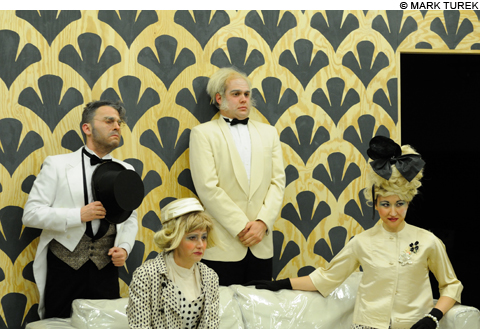
VIVA LA REVOLUTIONARIES Oliver, Davis, Dickie, and Coughlin. |
A totalitarian regime can persist for many reasons: widespread timidity, complacency, political expediency, fear, and so on. The same dynamics can enliven a dysfunctional family. Thereby hangs the politico-philosophical comedy Tango, by Polish dramatist Slawomir Mrozek, its mordant observations no less biting now than they were a half-century ago.
Staged by the Brown University/Trinity Rep MFA theater programs, and directed by Shana Gozansky, performances are in the Pell Chafee Performance Center through May 13.
A family of erstwhile revolutionaries, now mere counterculture Bohemians, have to contend with one of their number coming into power. The son of the family, Arthur (Will Austin), who was raised by this free living, free loving gaggle of misfits, realizes that he has the power to make weak-willed others do his bidding. He wants them to comply with rules — his rules — rather than rattle around in purposeless anarchy. Kind of like some populations follow strong-minded rulers.
The result is not just absurdist chaos hitherto unknown to this passive, nonaggressive mini-society, but also head-spinning changes in direction as their new leader casts about for schemes to make his authority work. Taking this all in stride, for the most part, are four family members and two integral outsiders. There are the father, Stomil (Tommy Dickie), and Uncle Eugene (Ricky Oliver), equally ineffectual men, and Arthur's mother, Eleonora (Ruth Coughlin), and grandma, Eugenia (Mary C. Davis), equally dotty women. Then there is lovely love interest Ala (Alexandra Lawrence) and a potentially sinister everyman, Eddie (Charlie Thurston), a thoughtless prole who gets along by going along when requested, whether it is as a gigolo or a thug.
Stagnation is part of what Arthur is working to repair. A grandfather has been dead for 10 years, yet his empty coffin is still part of the furniture of the room where all this takes place; Arthur puts grandma into this penalty box to "contemplate eternity" when she misbehaves.
We learn Arthur is a student when he mentions he's supposed to be studying for an exam. As such, he cycles through various modes of philosophical thought and political theory as the play goes on. Realism or idealism? Personal freedom or social control? Something's gotta work.
Tango was published in 1958 under Stalinist communist rule in Poland, and much of what is made fun of is hedonistic excess of the sort that would take place shortly in the streets of Paris and San Francisco in the '60s. Arthur's father waxes nostalgic over such indulgences as public sex (whether at the opera or a museum, he and his wife recall differently), and he proudly notes that they fought for the right to not give bus seats to the elderly. Ah, anarchy. "The greater the revolution, the greater the reconstruction," his father says.
Arthur, on the other hand, says he wants "world order — that and the right to rebel," to cover the bases. "Abnormality is the new normal," he complains to his parents, and when they are sympathetic, their tolerance frustrates him. Since he can't find meaning, he knows he has to make meaning. To that purpose, he decides he should marry Ala, though she is reluctant to accept, since his passion is coming from his brain rather than a more appropriate organ.